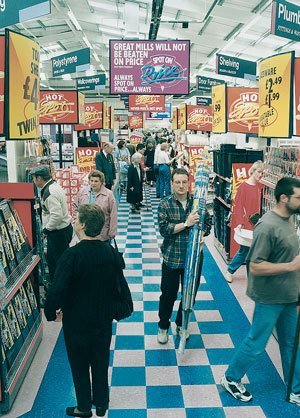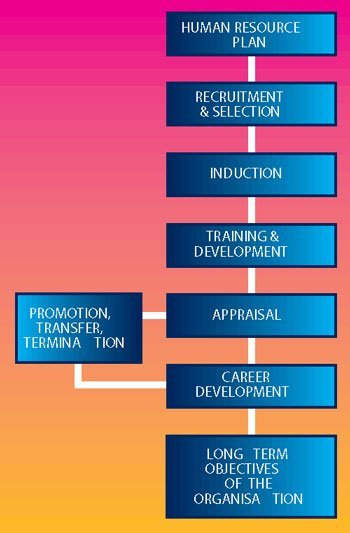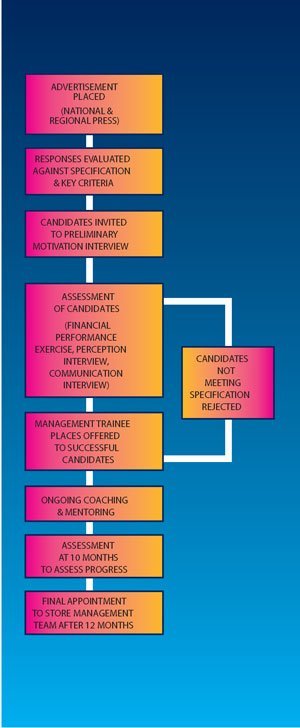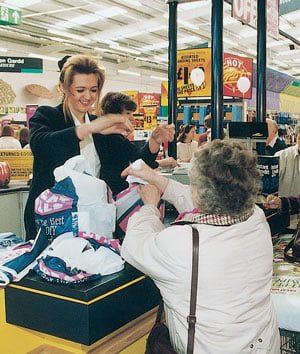
For these individuals, the workplace of the future will be quite different from that of the past. For example, there will be a continuing need to develop and update skills, be more flexible, work in teams empowered to make decisions and use information technology daily as part of working life. Many of these changes will have been influenced by external factors, such as increasing competition. All of these changes represent important challenges for the employees of the future.
This case study focuses upon the commitment of Great Mills, a leading DIY retailer, to the recruitment and development of its employees. Great Mills is not simply concerned with taking on individuals to fill specific job vacancies. The Company takes a longer-term view of recruitment and development, which hopefully will, over a period of time, recruit the individuals who fit in with the wider personnel strategy of the organisation.
Great Mills is one of the leaders in out of town retailing in the UK, operating a nationwide network of thriving DIY superstores and garden centres. From its beginning in 1972, Great Mills has grown from a small unit in Paulton, near Bath, serving mainly the building trade, to a multi-million pound business. Today the Company employs over 3000 people, has 92 stores nationally and is still expanding. Great Mills provides a wide range of goods at low prices, whilst making shopping easy for customers with spacious, well-designed stores and garden centres with ample free car-parking. The Company is part of RMC Group p.l.c, a major British Public Company.
THE PURPOSE OF RECRUITMENT IS TO BUY IN, RETAIN AND DEVELOP THE BEST PEOPLE TO MEET THE ORGANISATION’S NEEDS AND REQUIREMENTS.

This two-way process continues throughout employment, as only by satisfying the needs of the individual employee will Great Mills obtain the commitment to organisational objectives which is needed for organisational success and only by contributing to organisational success will employees be able to satisfy their personal employment needs.
Identifying future managers
At Great Mills the most valuable resource is its staff. For Great Mills to meet its continued commitment to growth, it has to think carefully about the qualities of the people it employs, because many of the trainee managers it employs today will be the senior managers of the future. Therefore, when deciding who to employ, any specifications must go beyond a simple description of a job or of a role.
Management is a way of getting things done, with the support and commitment of others. It involves deciding upon objectives and then developing ways of meeting these objectives. It involves making decisions – some day-to-day and some long-term – and includes planning, organising and coordinating activities. At Great Mills, management specifications include four areas relating to the qualities and abilities of managers. These are motivation, communication, perception and processing.
AT GREAT MILLS WE WANT THE KIND OF PERSON WHO:
Motivation
- Is interested in the product
- Likes seeing how much they can get people to buy
- Wants to sort out problems themselves
- Wants to be their own boss, free to make their own decisions
- Wants to see things improve
Communication
- Is good at talking and listening to people
- Believes in themselves
- Believes in people and is quick to use the best in others
Perception
- Uses their common sense
- Notices small details
- Notices how people are feeling
Processing
- Can see the wood for the trees
- Thinks on their feet and make quick decisions
- Tries out ideas
- Looks at a set of figures and quickly picks out the main points
Management Trainee Scheme
To develop people into managers with the right qualities and abilities, which in the future will enable them to match up to such demanding management specifications, Great Mills introduced a Management Trainee Scheme approximately 10 years ago. The aim of the scheme was to encourage applications from ambitious, enthusiastic young people who wanted to have a career in retailing.
Within the Management Trainee Scheme, which has been developed extensively over the years, training is progressive and challenging, covering a usual period of 12 months. Candidates undergo a period of training in one of the stores and also have short spells at Head Office and other support departments. External training is also undertaken, which include the development of management skills and the opportunity to attend a personal development programme in the outdoors.

Shortlisting It is not possible to interview everybody, nor is it necessary. Shortlisting is a way of sorting through applications and discarding those which do not meet the required criteria. Preliminary Interview The purpose of this interview is to establish the motivation of each candidate reaching this stage. Motivation is about enjoying the types of activities which make up the store management role. Something which one person finds fun will not appeal to others. Great Mills uses this interview to assess whether a candidate:
- could be interested in the product
- would have the potential to encourage people to buy
- would wish to sort problems out themselves
- would want to be their own boss
- would want to see things improve.
This interview lasts about an hour during which candidates are asked questions such as:
- what attracts you to DIY retailing?
- how well do you cope when faced with many things to do?
- how do you enjoy making decisions that affect others?
Assessment of candidates
Candidates need to be assessed against set criteria for a job. It is common practice to ask candidates to complete tests to help provide a better picture of their aptitude.
Great Mills asks its potential management trainees to carry out a ‘Financial Performance Exercise’ which comprises a series of financial information, representing key retailing issues, upon which candidates have to provide an analysis of the issues and a series of recommendations. Candidates are then assessed upon their understanding of issues and their performance throughout the exercise. This is a critical part of the selection procedure, which helps to provide a broader picture of each candidate’s abilities and how they can use their talents to try to solve problems.
Candidates are also required to undertake a perception interview. Perception is about noticing things, but being able to focus on what really matters. This requires alertness and the ability to think in a clear-headed way about what is relevant to the situation in hand. Specifically, Great Mills is looking for someone who uses their common sense to question things, notices important details and notices how people are feeling and behaving. Candidates are taken to a local store, where they have one hour to look around unaccompanied. After the hour, they are joined by an assessor who spends 30 minutes with the candidate walking around the store, assessing what they have noticed about the store in general and more specifically the candidate’s observations. After a break, the candidate will be joined by another assessor who will spend a further 30 minutes with the candidate, who during this time, will be asked to interview at least one member of staff and one customer.
Candidates are also asked to undertake a communication interview. Communication is about being self-confident and being able to relate well to people. This requires the ability to listen, make conversation and get the best out of people. Great Mills is looking for someone who is good at talking to people, believes in themselves, believes in people and is quick to use the best in others. Candidates are asked to approach one member of staff and interview them about their jobs, the things that motivate them and any problems or difficulties they have. They are also asked to approach two customers and by engaging them in conversation to try to create an opportunity to influence them to buy something.
After the assessments have been carried out, Management Trainee places are offered to successful candidates. The recruitment programme is specifically geared to the person Great Mills is trying to attract, with the potential to develop into a manager of the future. When the offer of employment is made to candidates, Great Mills finalises the terms of the offer and agrees with the candidate a suitable date for starting work. A contract of employment forms the formal and legal basis for the appointment.

Recruits are not just dropped in at the deep end, though they are given responsibility as early as possible. An induction process initially familiarises the new employee with various functions of the store in which they work. Throughout their early development there are courses for them to attend, as well as Weekly Assessments to undertake, which are later evaluated through Appraisal. An Individual Training Programme is designed and agreed with the trainee.
Trainees work with a ‘mentor’. Mentoring and coaching involve a more experienced member of the organisation pairing up with a less experienced member for guidance and training purposes. As part of the ‘In Store Development Programme,’ candidates are coached and assessed regularly. Any problems which employees may have are discussed with them and not just left buried. At 10 months, assessment is made to determine the progress of each candidate before a final appointment. For successful candidates this leads to a Store Management Team appointment after 12 months.

As a result of this, Great Mills introduced a National Vocational Qualifications programme at Level 2 in Retailing. Modern qualifications like NVQs are based upon a competence model. An NVQ is a statement of competence clearly relevant to work, that is intended to facilitate entry into – or progression in – employment, further education and training. It is issued by a nationally recognised awarding body, such as City & Guilds, to an individual. The statement of competence incorporates specified standards – the ability to perform a range of work-related activities and skills, including the demonstration of knowledge and understanding which underpin such performance in employment. NVQ programmes have not been compulsory but have resulted in:
- more able, flexible and committed staff
- improved customer service.
The results were significant and gave Great Mills the confidence to try to attain the Investors in People award. In December 1994, Great Mills made a commitment to a two-year programme designed to achieve the Investors in People standard. The Company would then be able to use this to show an ongoing commitment to the development of people through training and development.
Investors in People is the National Standard which sets a level of good practice for the training and development of people to achieve business goals. It provides a framework for cohesive action through:
- specifying the principles which tie training and development activity directly to business objectives
- ensuring resources committed to training and development are put to the most effective use
- providing a clear benchmark of good practice in training and development against which any organisation, large or small, can measure progress towards improved business performance.
The commitment by Great Mills in 1994 marked the beginning of a two-year programme which would provide long-term benefits for all employees.
Since Great Mills introduced its NVQ in Retailing and became involved in a range of initiatives designed to meet the National Standards, there has been a dramatic fall in staff turnover, from over 120% in 1988 to under 50% per year, which is average for the retail sector. By the end of 1995 more than 20% of Great Mills’ staff had obtained NVQ and a further 10% were working towards this goal. Recent exit interviews carried out for people leaving the company have noted that very few people completing NVQs have left Great Mills.
This helps to show that when a company recruits the right people and invests in its staff, they develop a longer-term commitment to that organisation because it fulfils their personal, professional and development needs. In other words they are happier to stay. Great Mills is equally happy for them to do so!
